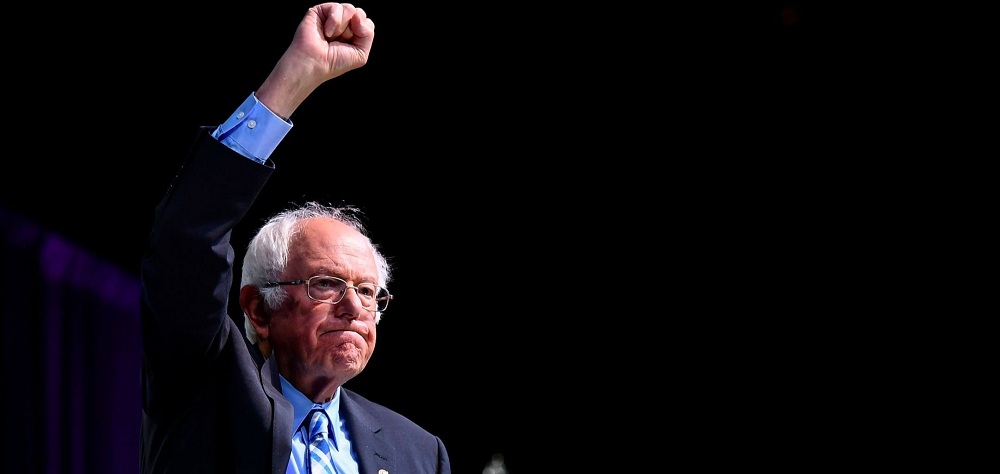Alwaght- As the November 3 presidential elections draw closer in the US, the attentions turn to see who will be the Democratic rival to Donald Trump. The 59th US elections are moving near while so far a fierce battle has been underway among Democratic hopefuls to see who can be the final Democratic candidate. In the meantime, even though Bernie Sanders has been a frontrunner in the competition, the Democratic rivals have unprecedentedly focused their criticism against him.
Sanders, 78, on the one side is under fire of his fellow party members and on the other side has been under a Trump-led campaign of face damaging as the contest heats up.
This antipathy to Sanders raises a question: Why is motivating Democratic nominees and also Trump to come against Sanders? What does make them fear a Sanders White House?
The iconoclastic Sanders
The major issue encouraging bipartisan opposition to Sanders's presidency is his being an iconoclast in US politics. Although he served as a senator for years in the Senate and in general in the US political system, he still shows in his opinions and decisions that he is essentially opposed to the dominant political and economic systems in his country.
In fact, what Sanders has in mind for the US economy and politics in case of victory in the upcoming elections can pave the way for fundamental changes in the US. Although Congress supervises the president’s decisions and actions, the head of the White House has tremendous capabilities to issue executive orders and make major decisions for the country. So, now even the Democrats are worried that in case of assuming the power at the White House, Sanders will introduce root changes to the dominant political and economic discourses in the US.
Sanders would be the first anti-Zionist Jewish president
Another reason that draws bipartisan opposition to Sanders is his anti-Zionist opinions. It should be taken into account that Sanders himself is an American Jew but is heavily opposed to the Zionism and the pro-Israeli lobbies in his country. He several times in his presidential campaigns voiced support to oppressed Palestinians who have been living under the Israeli occupation for over seven decades.
Even worse for the pro-Israeli voices in US politics is Sanders’ promise to stay away from the American Israeli Public Affairs Committee (AIPAC) summit scheduled for March 1-3. He also vowed to return the US embassy from Al-Quds (Jerusalem) to Tel Aviv. These stances aroused the ire of capitalist and political lobbies run by the Zionists. They are afraid that in case of being elected as US President, Sanders will take some punitive measures against the Israeli regime.
A socialist in the heart of capitalism center
Yet another reason the Democrats are taking stances against Sanders is American public’s unwelcome of his socialist slogans and approaches. After the end of WWII and during the Cold War, a period in which two major blocs of the West and East were engaged in a rivalry, the US led the Western bloc and the Soviet Union led the Eastern bloc. Several decades of the Cold War, which ended with the Soviet collapse, engraved negative sensitivity to socialism in the minds of the Western public. Even some socialists in the Western world were sued legally for their ideas.
Now the Democrats hold that in the US, the cradle of capitalism liberalism, attracting the votes of the American public by Sanders who apparently has socialist views is impossible. Still, it is important to know that since the fall of the Soviet Union in 1991 the American society has undergone substantial intellectual developments and some of the socialism-based programs of the Democratic Sanders can be even attractive for a large part of the American society.
A voice for the marginalized and neglected people
Sanders is attacked also by Trump and that is because of the similarity of the two sides in the way they attract the votes of the American citizens. In 2016, Trump raised populist slogans and asserted the need to fight corrupt, hypocritical, and lying officials. He vowed to the American votes that he will cleanse the White House of corrupt politicians. His emphasis was on offering care and privileges to the marginalized and neglected citizens, who helped him make his way to the White House.
Now Sanders on a larger scale and range is riding on the populism wave in the US. Like Trump in 2016, Sanders in 2020 is making slogans about changing the corrupt political system and taking care of the neglected. Although the neglected community has so far not effectively affected the presidential equations in the country, the confrontation of two rivals with similar populist promises and claims can record the highest rate of turnout in the November election. Meanwhile, Trump is afraid that arousing the lower classes could end up detrimental to his position and an uprising of the marginalized could send Sanders to the White House.



























